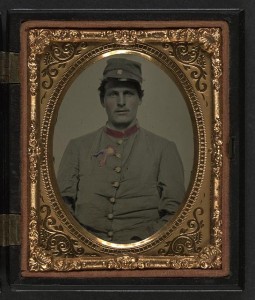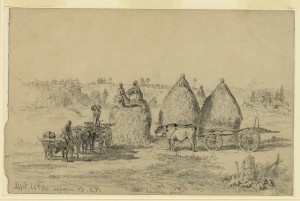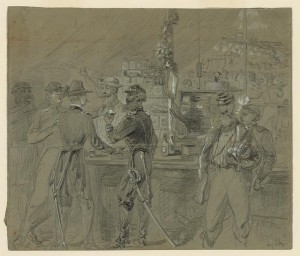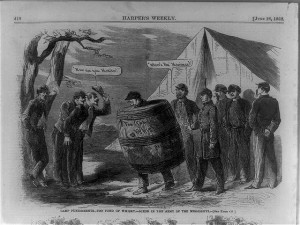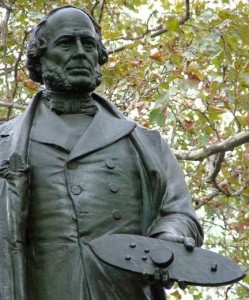In Lieu of Radway’s Ready Relief?
Given the Radway Company’s strong Union stance in yesterday’s post I doubt it is sending any of its wondrous elixir to Confederate soldiers. Here’s a story about a substitute in one Rebel camp.
From the Richmond Daily Dispatch October 22, 1861:
Smuggling whiskey in the Camp.
“Personne,” the intelligent and spicy correspondent of the Charleston Courier, writing from Fairfax, Oct. 11, communicates the following, which is a pretty fair specimen of the expedients which are resorted to for obtaining that favorite contraband of an army, whiskey:
Speaking of Bourbon, it is positively distressing to one with a sympathizing nature, to see the straits to which the soldiers are occasionally reduced by the want of their accustomed stimuli. Liquor of any kind is a rarity, and the more difficult it is to obtain, the greater is its abuse. Speculators among the soldiers are selling rifled stuff, which is a cross between sheet lightning and North Carolina turpentine, at three dollars a quart, while the Provost Marshal has confiscated a lot, which, at auction, would not bring fifteen cents a gallon.–Now and then some sharp captain, while foraging, will secure enough to last himself and comrades one drink round, but this is the exception and not the rule. The article is tabooed wherever found. Even private packages are not exempt from examination, and the presence of half a dozen straws from the crevice of a box is evidence on which an official wedge or axe is brought into requisition to discover the liquid iniquity. Smuggling is, therefore, again coming into vogue. Several days ago a terrible rumpus was created in one of the camps by the development of some twenty or thirty men so intoxicated as to be unable to engage in the evening drill. An examination was at once set on foot to ascertain where the liquor had been obtained, but without success. The next day another party were also drunk, and for nearly a week the occurrence was repeated, in spite of the utmost vigilance. Finally, one of the delinquents, a royally happy Irishman, was brought to headquarters, where the perplexed officers were holding a consultation over the strange proceedings.
“The top o’ the mornin’ to yez, gintlemen.”
“Silence!” thundered the Colonel–“You’re drunk, sir.”
“Dhrunk is it, sure; begorra, its only delighted that I am to recaive a letter from me swateheart.”
“Tell me where you got your liquor, instantly, sir.”
“Whiskey, d’ye mane, Kern’l — I hav’nt had a smill of the craythur for the lasht six wakes.”
At this juncture one of the officers called attention to a little stream that was trickling down the Paddy’s ear.
“What’s that?” demanded the Colonel.
Mike slipped his hand up to the delinquent auricular, and drawing his finger across his mouth to taste the drop he now felt, an expression of comic guiltiness took possession of his face, as if he had discovered something going wrong, and he replied–
“By the powers, Kern’l, but it’s a warrum day. I belave I’m prespiring.”
“Take off your cap, sir.”
“That I will, sur, to any gintleman like yer honor.”
Mike’s head was as wet as a soaked dish rag; and it was now observed that his cap, usually so pliable, was stiff and unruly with some suspicious contents.
“Hand it to me, sir.”
“Indade Kern’l, but it’s nothing but me handkerchief.”
He had to pass it over, however, and much to the mortification of Pat, the officers drew forth an object which at first puzzled the credulity of every person present, and which would be an equal puzzle to your best guess. It was about eighteen inches of the entrails of an ox, dried and prepared for this novel use, filled with a pint or two of “torch-light procession,” and tied at both ends. Unfortunately for Mike, one of these had become loose, and his extraordinary “prespiration,” led to the long sought discovery. The “milk in the cocoa nut” of the regiment being thus accounted for, the delinquent was dismissed for extra duty, and to give the Colonel and his brother inquisitors an opportunity to let out the broad “guffaws” which had been accumulating during the strange examination. Others of these intestinal arrangements were subsequently found, and I need not add that no further trouble has been experienced there from surreptitious drinks.
I think it’s a great story. How truthful it is – that’s another question. I can be a pretty gullible person, but I’m becoming more skeptical about articles I’m reading in the newspapers. The following appeared in the same issue of the Daily Dispatch:
Spicy letter from a Yankee girl.
–The following letter, found on the body of one of the slain at Manassas, has been sent to an exchange for publication. Every assurance is given that it is genuine:
Providence, Rhode Island, July 9th, 1861.
Dear Georges:
Yours of the 3d instant came to hand to day, which found me enjoying health, and at once revived and raised for you my heartfelt passion to a considerable extent.–And glad I am to hear that your regiment have got in the land of the rebels and are well and ready to drive them from the soil of liberty and love. Mrs. Ribburn received a letter from her husband, the Captain of the Rhode Island Artillery, that he would play Yankee Doodle on the rebels at Bull Run on the 21st of this month, and I am told that on the 28th of the same month you are to have a grand ball at Richmond, with Jeff. Davis and Beauregard, assisted by many of the Southern girls as waiters. …
I appreciate the assurance of genuineness because it’s amazing that the spicy girl could predict the date and place of the upcoming battle but get the victor wrong.
The other thing about the whiskey article – obviously both Yankees and Rebels drank alcohol.
The reference to The Monitor and Merrimac is ahead of schedule but somehow appropriate because 150 years ago today John Ericsson laid the keel of the USS Monitor at Greenpoint, Brooklyn.

